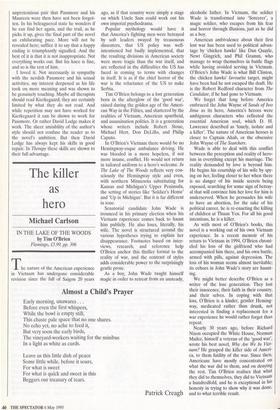The killer as hero
Michael Carlson
IN THE LAKE OF THE WOODS by Tim O'Brien Flamingo, £5.99, pp. 306 The nature of the American experience in Vietnam has undergone considerable revision since the fall of Saigon 20 years ago, as if that country were simply a stage on which Uncle Sam could work out his own imperial psychodrama.
Popular mythology would have it that America's fighting men were betrayed by soft leaders swayed by treasonous dissenters, that US policy was well- intentioned but badly implemented, that the resulting divisions in American society were more tragic than the war itself, and are reflected in the difficulties the US has faced in coming to terms with changes in itself. It is as if the chief horror of the war is the reluctance of the US to nuke Serbia.
Tim O'Brien belongs to a lost generation born in the afterglow of the 'good war', raised during the golden age of the Ameri- can Way in the Fifties, and shattered by the realities of Vietnam, American apartheid, and assassination politics. It is a generation whose writers include Robert Stone, Michael Herr, Don DeLillo, and Philip Caputo.
In O'Brien's Vietnam there would be no Hemingway-esque ambulance driving. He was blooded in a more hopeless, if not more insane, conflict. He would not return in tailored uniform to a hero's welcome. In The Lake of The Woods reflects very con- sciously the Hemingway style and even, with northern Minnesota substituting for Kansas and Michigan's Upper Peninsula, the setting of stories like 'Soldier's Home' and 'Up in Michigan'. But it is far different in tone.
Senatorial candidate John Wade is trounced in his primary election when his Vietnam experience comes back to haunt him publicly. He also loses, literally, his wife. The novel is structured around the various hypotheses trying to explain her disappearance. Footnotes based on inter- views, research, and reference help O'Brien anchor this thriller format to the reality of war, and the contrast of styles adds considerable power to the surprisingly gentle prose.
As a boy, John Wade taught himself magic in order to retreat from an unsteady,
Patrick Creagh
Almost a Child's Prayer
Early morning, unawares . . .
Before even the first whispers, While the bowl is empty still, This chaste pale space that no one shares.
No echo yet, no ache to feed it, But very soon the early birds, The vineyard-workers waiting for the minibus In a light as white as curds.
Leave us this little dish of peace Some little while, before it sours, For what is sweet For what is quick and sweet in this Beggars our treasury of tears.
alcoholic father. In Vietnam, the soldier Wade is transformed into 'Sorcerer', a magic soldier, who escapes from his fear and horror through illusions, just as he did as a boy.
American ambivalence about their first lost war has been used to political advan- tage by 'chicken hawks' like Dan Quayle, Newt Gingrich, and Phil Gramm, who manage to wrap themselves in battle flags while having avoided serving in Vietnam. O'Brien's John Wade is what Bill Clinton, the chicken hawks' favourite target, might have been had he not escaped the draft. He is the Robert Redford character from The Candidate, if he had gone to Vietnam.
We forget that long before America embraced the John Wayne of Sands of Iwo Jima as its hero, America's heroes were ambiguous characters who reflected the essential American soul, which D. H. Lawrence described as 'lonely, isolate and a killer'. The nature of American heroes is closer to Captain Ahab, or the obsessive John Wayne of The Searchers.
Wade is able to deal with this conflict between the perception and reality of hero- ism in everything except his marriage. The reality demanded by love is beyond him. He begins his courtship of his wife by spy- ing on her, feeling closer to her when there is no danger of his inside secrets being exposed, searching for some sign of betray- al that will convince him her love for him is underserved. When he persuades his wife to have an abortion, for the sake of his political career, he is re-enacting the killing of children at Thuan Yen. For all his good intentions, he is a killer.
As with most of O'Brien's books, this novel is a working out of his own Vietnam experience. In a recent memoir of his return to Vietnam in 1994, O'Brien chroni- cled his loss of the girlfriend who had accompanied him there, and his own battle, armed with pills, against depression. The loss of his woman seems almost inevitable; its echoes in John Wade's story are haunt- ing.
We might better describe O'Brien as a writer of the loss generation. They lost their innocence, their faith in their country, and their selves. In coping with that loss, O'Brien is a kinder, gentler Heming- way, medicated rather than drunk, not interested in finding a replacement for a war experience he would rather forget than repeat. Nearly 30 years ago, before Richard Nixon occupied the White House, Norman Mailer, himself a veteran of the 'good war', wrote his best novel, Why Are We In Viet- nam? He grasped the killer side of Ameri- ca, to them futility of the war. Since then, Americans have mostly concentrated on what the war did to them, and on denying the rest. Tim O'Brien realises that what they did to themselves, they did to Vietnam a hundredfold, and he is exceptional in his honesty in trying to show why it was done, and to what terrible result.


































































 Previous page
Previous page